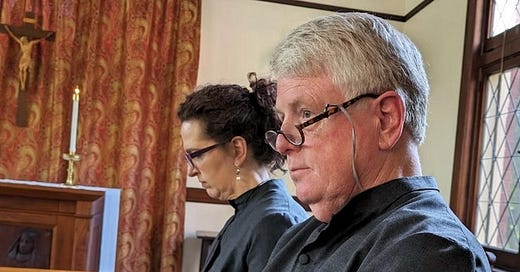Today’s posting comes from Brother Scott, OA. Scott Benhase was the 10th Bishop of the Diocese of Georgia and is currently serving as Assisting Bishop, Diocese of Florida. He is a Professed Member of the Order of the Ascension and was the 2nd and 6th superior of the Order.
In the last months we’ve been reading the Prophet Isaiah in the Daily Office. Isaiah is considered one of the great preachers of the Bible. Even if we add in the preachers of the Church (e.g., John Chrysostom or Jonathan Edwards), Isaiah still is right up there. His prophetic word for Israel was full of strong metaphors and plain-spoken cries for God’s justice to many people who had turned their backs on the Torah’s call for compassion and mercy, particularly to the poor and marginalized. And yet, Isaiah as a preacher was a failure. His warnings went unheeded. His calls for justice primarily fell on deaf ears. However eloquent and powerful were his words, the people for whom they were intended didn’t change their ways. Judah and Jerusalem were laid waste, her leaders carted off to slavery and the rest became de facto indentured servants of their conquerors…for centuries. This should be a lesson for us preachers today. Is it to sound like Isaiah?
What might our purpose be in preaching? What’s the outcome we desire when we step up on Sunday to declare God’s word to those in attendance? While we might not all agree as to the outcome desired in our preaching, let me put forth my hope when I preach. I hope that those hearing my words will have their hearts and minds opened to the amazing grace of God, that they’ll leave church that day, because of my preaching, trusting more deeply in God’s mercy in their lives and begin to live merciful lives themselves, even if it is only in small fits and starts. To me, that’s the outcome desired.
I spent decades, however, preaching with another outcome in mind: cajoling my congregation because they weren’t living fully into what I thought were God’s standard of justice and righteousness in their lives. I don’t think I was fully conscious of what I was doing and would’ve probably strongly objected back then to any critique that concluded that, but that was what I was doing.
I remember one sermon in 2003 when I, emulating St. Ambrose’s excommunication of the Emperor Theodosius, did the same to George W Bush for his unrepentant sins in Iraq. The sermon made me feel so morally superior and many people in my parish who shared my worldview were impressed by my courage and “prophetic” word. I am quite certain, however, that no hearts and minds were changed and that no one, because of my sermon, began to trust more deeply in the mercy of God in their own lives.
And that brings us to the current occupant of the White House. While pleading for mercy is always in order, no matter the context or place, we should remain sanguine about our capacities. If I thought preachers would make a difference by railing against Trump’s many sins (and they are too many to count), then I’d say: Have at it on Sunday. Preach like Isaiah. Just don’t expect any result different from Isaiah’s.
In the end, we can feel righteous and on the right side of history, but let’s not fool ourselves into believing we will change any hearts and minds. My hunch is no one will come any closer to deepening their trust in the grace and mercy of God. If, however, our preaching goes to the hearts of those listening, opening their minds to the unmerited love of God shown to them in Jesus’s cross, then they may begin to move toward showing unmerited love to others, regardless, say, of their documented status. We can only hope.
+Scott
Brother Scott, OA
The Feast of Thomas Bray, Priest and Missionary, 1730





Thomas Bray was one of the English Priests who tried to catechize Africans in the USA, much to the chagrin of the cavalier class of Virginia planters. At that time, baptism also conveyed a political freedom that was anathema to the interests of slaveholders.
When I was studying Anglicanism and the history of slavery in divinity school, Bray was one of the shining lights of the English Mission. Unfortunately, the lay leaders of the church did not share his egalitarian sensibilities, and is one reason the Episcopal Church has such a congregational slant: a distrust of abolitionist bishops from London who would routinely send to the colonies priests who would challenge the local depravity of the wealthy colonial class.
They much preferred the priests who were scoundrels themselves. For a time.